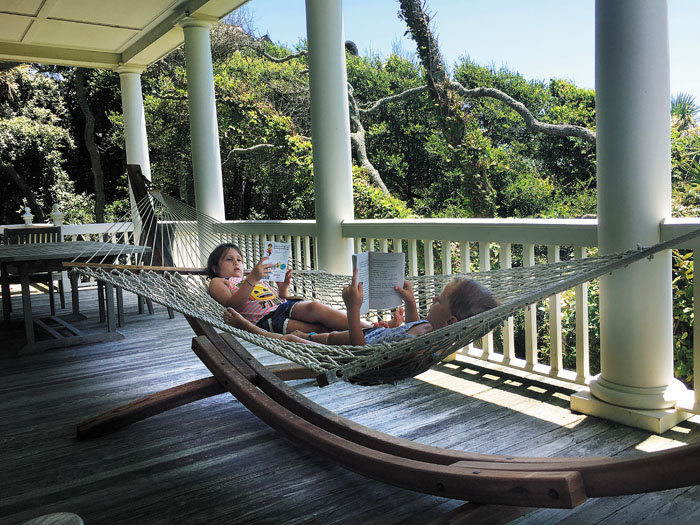Clyde, Time Was: Come ‘set’ a spell on the porch and relax
Published 12:00 am Sunday, September 3, 2017

- Photographer Wayne Hinshaw's granddaughters, Kathryn and Audrey, rest on a porch hammock reading their books. photo by Wayne HInshaw, for the Salisbury Post
Time was we had porches and screen doors. Usually on the back el of the kitchen across from the outside “zink,” there was plenty of room for a nice cross-breeze and valuable porch time. Not always, work spread out on tables covered with oilcloth, porcelain pans and dippers, and screen fly swatters. A wad of snow-white cotton stuck on the screen door was supposed to keep flies out.
Not enough theater plays, “Mornings at Seven,” “To Kill A Mockingbird,” “The Dixieland Hotel” and “Look Homeward, Angel,” to name a few, use the proverbial pine plank porch as its setting. It was the site for canning corn, snapping beans, stewing figs or shelling peas, whichever was going to the bad. Winter on the porch was the time for marble slabs left to chill until boiled sugar poured out with peppermint flavoring and crystallized into green, pink or yellow mints.
The front porch underneath the big trees was more of a Sunday thing for company. The fancy wrought iron rails and aluminum gliders did not squeak nearly as sweet as those worn out rockers out back. Combine that with the distant slam of the screened-in door, a fading light of day with an evening star, and you have the perfect recipe for a catnap.
Why has NASA not been able to zero in on the lowly mosquito to keep them from coming from outer space to attack us like dive-bombing Kamikaze?
The word “porch” comes from the Latin “portia” or gate.
Medics know about ports and trekkies know about portals. Most porches of the world overlook gardens out back. Only privileged Americans have room for great expanses of fescue, plastic tubes of irrigation, behemoth riding mowers, edgers and screaming Weedeaters — all gasoline-powered, as if in some secret redneck suburban contest on who can spend the most time or money on the “durned” yard.
The word “yard” comes from the same root as garden and orchard. Who knew? Of course, we have big picture windows out front, but they are always tightly covered with drapes, shades, blinds and plantation shutters that never even let in light or air. Who enjoys the pine-needled mountains of bark mulch dyed red, Roundup-laden cement walks with no one coming to the front door anyways? Can we say fake front yards or just “putting on your silk front shirt (while wearing dirty underwear)” as Ms. Seaber at the Hall House used to say? Are windows for looking in or looking out? Ask Tom.
“The Art of Beautifying the Suburban Home Grounds” in 1870 tells us, “Leave a fair space on the other side, upon which the best rooms and the verandas (porches), which may be considered the most pleasant summer rooms, are located. The ground plans are supposed to open into the yards adjoining, left unplanted with anything that will obstruct views across the lawn.”
It continues, “A house that is nested in shrubs which seem to spring out of the freedom that characterizes similar vegetation springing naturally along stone walls and fences, seem to express the mutual recognition and dependence of nature and in the setting of the verdure and blossoms.”
Don’t anyone tell the city code enforcement boys that measure anything over 12 inches high as noxious weeds. Too many gardeners equate the word “vine” with snakes, poison ivy and invasive. “The Chinese Wisteria is probably better adapted to cover the lofty trees than other climbers, but the trumpet vine, Virginia creeper, the native varieties of the clematis, and the Japanese and Chinese honeysuckles, along with the wild grape may be used.” Kudzu and morning glories are free.
A little frame around your porch view may soften your take on the outside world. From where you sit, what do you see that is beautiful or pleasant? Maybe an 18-foot high brick wall, if you live behind the new fire department. The porch gives you, the overseer, the way to overlook your surroundings and make an overview of your predicament looking out.
“From the dining room window which opens upon the veranda, pleasing vistas down the grape-walks and the pear-walks will be seen through the vine-covered parts of the veranda, and the arches that mark the entrances to those walks. The height of the veranda floor will conceal one third of the gravel space in front of the carriage house from the eye of the person sitting in the room, so that the vines that should wreath the end-opening of the veranda and the ardes beyond, and their interior perspective, will be the principal objects in view.”
So come “set” a spell with me behind the tendril-entwined balusters; fetch a gout stool or grab the nearest bench, prop your feet up, get a refill and relax, rewind, recharge and reward yo’self for a good day’s work, a job well done, a task completed. Add a sprinkle of a few lightning bugs, the whirr of tree frogs, a distant train fading away taking travelers to another awaiting destination, not far off the line. Let the rest of the world go by. God is in his heaven, but all is not right with his world.
Clyde, who has dropped his last name, is a Salisbury artist.

